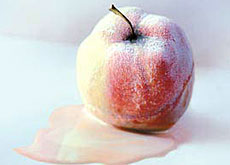Strauss waltz gets first airing

An unknown waltz by the Austrian composer, Johann Strauss I, has been played for the first time ever by a Fribourg marching band.
Composed by Vienna’s original “king of waltzes” in 1840, the partition ended up in Switzerland after a long journey across the Atlantic.
Raphaël Barras, an honorary member of the amateur Union Instrumentale, has wanted to play “Die Debütanten” (The Novices) ever since he was given the original score 20 years ago.
“My aunt was married to a music professor who received the partition as a gift from one his students,” said Barras. “When the professor passed away, she gave me the score.”
The waltz’s authenticity was certified in the 1950s by Karl Jindracek, a Viennese music specialist.
“Die Debütanten” is just one of many waltzes composed by the elder figure of the Strauss musical family. In his short lifetime (1804-1849), he managed to write over 250 different musical pieces.
Musical adaptation
The waltz heard in Fribourg was not played exactly as the composer intended. The score was originally composed for a symphonic orchestra, and had to be adapted for a marching band, which has no stringed instruments.
“There were 41 pages to adapt and it took between 100 and 120 hours work to rewrite the partition,” said Pierre-Etienne Sagnol, the Union’s conductor. “Fortunately, the original score was in good shape.”
Strauss, who was probably commissioned to compose the waltz, only penned the first page of the partition himself, with the rest completed by one of the musicians from his orchestra as he dictated the score.
According to music specialists, this was apparently not an unusual procedure at the time.
Music ambassador
Chief conductor at the Austrian court’s balls, Strauss senior is best known as the man who gave the world the Viennese waltz as we know it today, even though his accomplishments have been long since eclipsed by his son Johann.
After beginning his career as a violinist, Strauss turned successfully to conducting, and was soon acting as an ambassador for Viennese music and taking it abroad.
The Austrian state recognised his cultural role, making him Bandmaster of the First Vienna Militia Regiment.
Strauss didn’t stick just to waltzes during his career. His “Radetsky March”, composed just one year before his death, is played regularly by orchestras around the world and is a firm favourite with Swiss marching bands.
swissinfo, Scott Capper
Johann Strauss Sr., head of the prolific musical family, was born in 1804 in Vienna and died there in 1849 of scarlet fever.
He composed over 250 musical pieces and is considered to be the father of the Viennese waltz.
“Die Debütanten” was his 192nd waltz, and was probably a commissioned piece.

In compliance with the JTI standards
More: SWI swissinfo.ch certified by the Journalism Trust Initiative


You can find an overview of ongoing debates with our journalists here. Please join us!
If you want to start a conversation about a topic raised in this article or want to report factual errors, email us at english@swissinfo.ch.